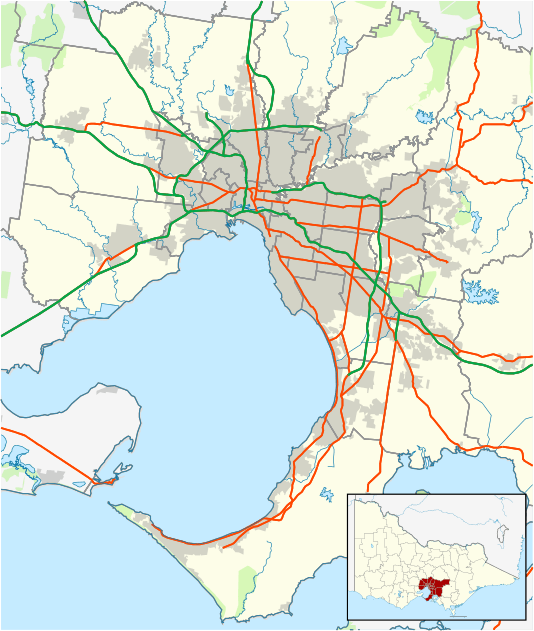Coburg North, Victoria
| Coburg North Melbourne, Victoria | |||||||||||||
|---|---|---|---|---|---|---|---|---|---|---|---|---|---|
 Coburg North | |||||||||||||
| Coordinates | 37°43′34″S 144°57′36″E / 37.726°S 144.96°ECoordinates: 37°43′34″S 144°57′36″E / 37.726°S 144.96°E | ||||||||||||
| Population | 6,576 (2011 census)[1] | ||||||||||||
| • Density | 1,342/km2 (3,480/sq mi) | ||||||||||||
| Postcode(s) | 3058 | ||||||||||||
| Area | 4.9 km2 (1.9 sq mi) | ||||||||||||
| Location | 10 km (6 mi) from Melbourne | ||||||||||||
| LGA(s) | City of Moreland | ||||||||||||
| State electorate(s) | |||||||||||||
| Federal Division(s) | Wills | ||||||||||||
| |||||||||||||
Coburg North is a suburb of Melbourne, Victoria, Australia, 10 km north of Melbourne's central business district. Its local government area is the City of Moreland. At the 2011 Census, Coburg North had a population of 6,576.
The suburb lies north of Coburg, and has the same postcode (3058). The majority of Coburg North is zoned residential, though there are some industrial pockets. The major commercial strip on Sydney Road is primarily automotive-related businesses. Merlynston has a small shopping strip with some cafes. The rest of the suburb is reliant on corner shops for everyday needs.
History
Coburg North Post Office opened on 1 August 1857 and closed in 1980.[2]
Housing
A large number of the houses in the area have two bedrooms and are made of brick, some with a weatherboard extension. These were constructed in bulk by the Housing Commission of Victoria, and most follow a standard design and layout. The weatherboard extension appears to be standard feature on houses of this period, and can take the form of a third bedroom, extended kitchen or laundry, or a standalone shed. Some houses share a common wall as a duplex unit.
After the close of the Kodak Factory in 2005, the land began being turned into a A$250 million 21 hectares (52 acres) housing site for 1000 people.[3]
Local industry
Industry in Coburg North is concentrated in the area bounded by Gaffney Street, Sydney Road, Shorts Road and Sussex Street. A notable and major industry in the suburb used to be a factory owned by Kodak, on two sites either side of Edgars Creek used for photographic paper manufacture and film processing. With the popularity of digital photography, Kodak has closed the factory.
Geography
Geographical features in North Coburg include:
- The Coburg Olympic Pool
- A golf range near Merri Creek
- Village Coburg Drive-in
- Coburg Lake
- Cash Reserve
- Richards Reserve (where the Velodrome is)
- Parker Reserve (Baseball Diamond) with two cricket fields next to it
- Harold Stevens Athletics Field
- Cox Reserve
- Hosken Reserve
- Sanger Reserve
Educational facilities
Coburg North has an Islamic college, a Catholic college and a campus of Kangan Batman TAFE focussed on automotive training, and two primary schools; Coburg North Primary School and Newlands Primary School. Newlands Primary School, No 4646, was built in 1951 to a design attributed to Percy Everett, the chief architect of the Public Works Department of Victoria (PWD). It was built on the borders of the former Cities of Coburg and Preston as a model school with rooms of hexagonal design.[4] The Newlands Primary School building is Heritage listed (ID # 18497).[5]
Transport
Coburg North has two train stations, Batman and Merlynston on the Upfield railway line. Tram route 19 travels along Sydney Road from the terminus at Bakers Road, Coburg North to Flinders Street Station in the city.
Cyclists can access the Upfield Bike Path and the Merri Creek Trail. A new style bike path was also constructed along O'Hea Street that currently starts at Sussex Street and finishes at Sydney Road. Sections through Pentridge and McDonalds Reserve have been constructed and will open in early 2011. This will mean the bike path links to the Merri Creek Trail. Council has plans to continue the path from Sussex Street to Glenroy.
See also
- City of Coburg - the former local government area of which Coburg North was a part
References
- ↑ Australian Bureau of Statistics (31 October 2012). "Coburg North (State Suburb)". 2011 Census QuickStats. Retrieved 23 June 2012.
- ↑ Premier Postal History. "Post Office List". Retrieved 11 April 2008
- ↑ http://moreland-leader.whereilive.com.au/news/story/work-begins-on-kodak-site-estate/
- ↑ Calleja, C., Hubbard, T., and Raworth, B., 1990, City of Coburg Heritage Conservation and Streetscape Study.
- ↑ "Place ID 18497". Australian Heritage Database. Department of the Environment.